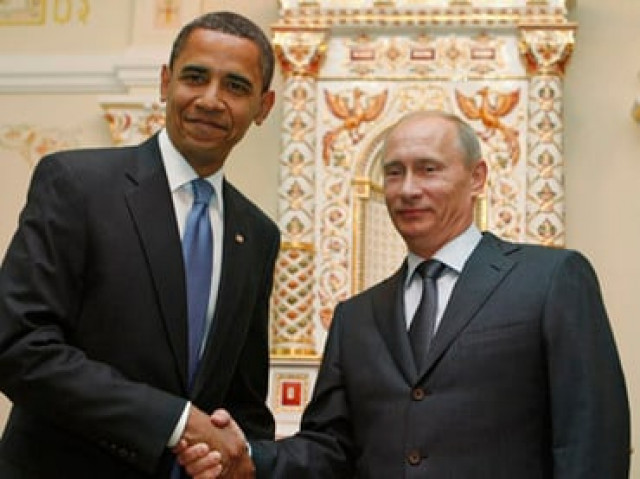Obama to press Putin on Syria at G20 amid skepticism
The talks at G20, Mexico will test whether the two leaders can find a common ground on Syria and other disputes.

After a week of Cold War-style recriminations between US and Russian diplomats, the talks at a Group of 20 summit in Mexico will test whether the two leaders can forge a working relationship and find common ground on Syria and other festering disputes.
Suspension of the UN monitoring mission in Syria over the weekend has put added pressure on Obama and Putin, meeting for the first time since the Russian president's re-election, to act decisively to keep the conflict from spiraling into civil war.
But with relations frayed and expectations low on both sides for progress on breaking the deadlock, the stage is set for an uncomfortable meeting in the Pacific resort of Los Cabos.
Diplomatic efforts will be further complicated by Obama's re-election battle against Republican Mitt Romney - who has called Russia "our number one geopolitical foe" - as well as questions on how far Putin might go in translating his anti-Western rhetoric into actual policy.
The hardened tone appears to mark the endpoint of Obama's "reset" of ties with Moscow, pursued with Putin predecessor Dmitry Medvedev and touted by the White House as a signature foreign policy accomplishment.
With Syrian President Bashar al-Assad continuing his bloody, 15-month crackdown on the opposition, Obama and Western allies want veto-wielding Moscow to stop shielding him from further UN Security Council sanctions aimed at forcing him from power.
But Putin, a former KGB spymaster, is suspicious of US motives especially after the NATO-assisted ouster of Libyan leader Muammar Gaddafi last year, and has offered little sign of softening his stance on Syria.
Though Washington has shown no appetite for a new Libya-style intervention, Russia is reluctant to abandon its Syrian ally, a long-time arms customer, and risk losing its last firm foothold in the Middle East, including access to a warm-water navy base.
Obama's aides say they are counting on other G20 leaders such as British Prime Minister David Cameron also to exert pressure on Putin. But Putin can expect solidarity from China, which has joined in blocking anti-Assad moves at the United Nations.
Angry Retort
The seriousness of the rift between Washington and Moscow was underscored last week when Secretary of State Hillary Clinton accused Russia of supplying Assad with attack helicopters. This drew an angry retort from the Kremlin.
"Some people are trying to spoil the atmosphere of these talks," said Yuri Ushakov, Putin's adviser on foreign policy.
He cited not only the arms sale accusation but also a proposed new bill in the US Congress, the so-called "Magnitsky" law that would target Russian human rights violators, legislation he called "anti-Russian."
Putin focused on another irritant in relations on Thursday, warning ominously of an "appropriate reaction" to US-backed missile defense plans for Europe that Moscow vehemently opposes.
Obama may seek to lower the temperature, but he also wants to be assertive enough to avoid giving Republicans an opening to accuse him of being soft on Moscow at a time when he is already struggling to defend his record on the economy. At the same time, he faces criticism for not providing stronger leadership on Syria.
For his part, Putin will be in no mood for concessions that could be seen as weakness as he seeks to quell dissent at home with tactics that are drawing US criticism. He also will be wary of making commitments to an American president whose future remains uncertain beyond the November 6 election.
On a personal level, there is reason to doubt whether "No-Drama" Obama and tough-talking Putin will click. Their body language will be dissected by the media for any hint of where the relationship is heading.
Their first meeting, nearly three years ago at Putin's dacha when he was prime minister, was by most accounts an awkward one, with Obama subjected to a long monologue of Russian grievances.
But Obama aides say the initial improvement in relations, which came after ties soured near the end of President George
W. Bush's tenure would not have been possible without Putin's behind-the-scenes support.
Los Cabos, where the broader summit will focus on the euro zone crisis threatening the world economy, will be a chance for both leaders to make their case. But no new ideas are expected.
Obama will urge Putin to use his influence with Assad to accept a transition modeled on Yemen's, in which an autocratic president was pushed out, US officials say. Moscow has signaled its opposition to making Assad's exit a pre-condition.
The White House also hopes to placate a key Russian concern. "It's not our goal in Syria to eliminate Russian influence,"
US deputy national security adviser Ben Rhodes told reporters.
Putin is likely to push for an international "contact group" that would include Iran, which counts Syria as its only real ally in the region. The United States opposes any Iranian role.
Still, Obama will tread carefully with Putin on Iran. Russia is hosting the next round of talks between Iran and world powers this week, and Washington wants Moscow to do more to help pressure Tehran to curb its nuclear program.



















COMMENTS
Comments are moderated and generally will be posted if they are on-topic and not abusive.
For more information, please see our Comments FAQ